Welcome to Trinity Laban Crosscurrent, a music and dance podcast brought to you by London’s creative conservatoire, unearthing interesting and divergent stories in the performing arts.
This episode we are in conversation with women in the arts and we will be talking about Trinity Laban’s Venus Blazing initiative. We will also be meeting Musical Theatre writing partners Caroline Wigmore and Jen Green who recently workshopped their show The Bachelor Girls with volunteers from Trinity Laban Musical Theatre. First, we meet two recent dance faculty graduates who are building successful careers in the industry. (Main image: Miia Makila, credit Helen Murray for LAND)
Interview with dance alumni Miia Mäkilä and Wilhelmina Ojanen
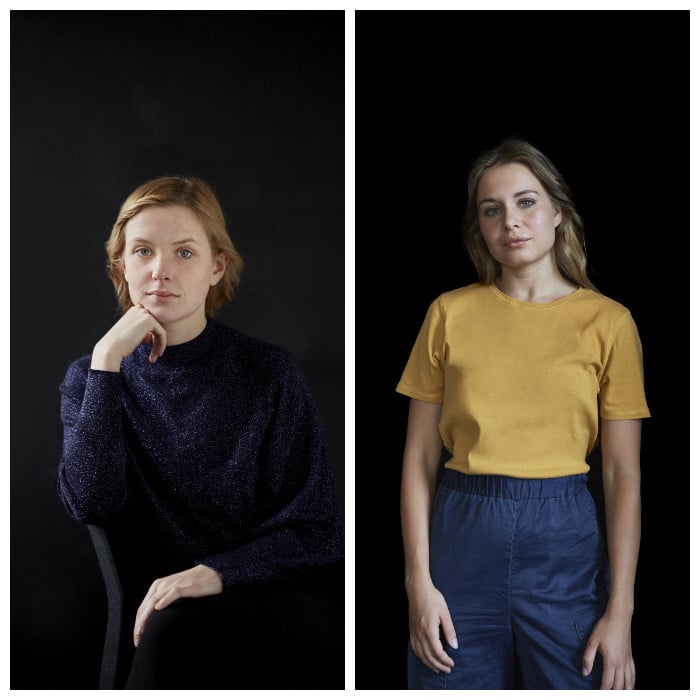
Image L-R: Wilhelmina Ojanen and Miia Mäkilä by Rocio Chacon
WO: I’m Wilhelmina Ojanen and I’m a dance maker from Tampere, Finland.
MM: My name is Miia Mäkilä and I’m a performer and freelance dance artist from Finland as well.
WO: We both studied in the BA course at Trinity Laban from 2014 – 2017, and I did an additional year in the MA dance Performance Programme.
WH: What have you been doing since graduating?
MM: Since graduating I have been working as a performer, mostly working with Wilhelmina and with Trinity Laban graduates, so it’s nice to have that community and network still.
WO: I’ve been mostly working as a choreographer. Since spring 2018 I have been a Young Associate Artist at Sadlers Wells, and that’s where me and Miia have worked together on a few occasions.
MM: We’ve also performed at the Resolution festival last year and we had a residency at TripSpace last July together.
WH: Wil, tell us about the Sadlers Wells Young Associates programme?
WO: The Sadlers Wells Young Associates programme is a two-year artist development programme aimed at young artists at the beginning of their career, and as part of that we’ve made two commissioned pieces. The first piece we made together was A Quiet Hope, which was for the Lilian Baylis Theatre last year in October. This year on July 17th we had the privilege of being on the main stage at Sadlers Wells; that was where we created LAND, it was kind of a diptych, the two parts existed in parallel to each other but also as two sides of the same theme which was human relationship with earth and the current climate breakdown.
WH: Miia, you’re involved in The Natashas Project?
MM: Yes, I’ve been with them for almost a year now. The Natashas Project is a contemporary dance and physical theatre company that aims to inform and equip the public about human trafficking and modern-day slavery. It also supports the survivors to regain their ownership of their bodies. It is co-directed by two incredible women, Erena Bordon Sanchez and Harriet Parker-Beldeau and they are actually both graduated from Trinity Laban.
WW: is everyone in the company female?
MM: We are all women, but it is not exclusive. We have three different approaches; we do performance productions and we also do educational workshops for students as well as restorative workshops for the survivors.
[musical sound effect]
—
WH: We will return to that conversation with Miia and Wilhelmina later. Next, we meet Musical theatre collaborative writing duo Caroline Wigmore and Jen Green.
[Skype sound]
Interview with musical theatre writing duo, Caroline Wigmore and Jen Green.
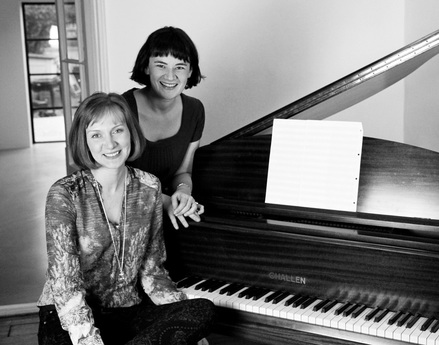
Image L-R: Caroline Wigmore and Jen Green
CW: Hi I’m Caroline Wigmore.
JG: And I’m Jen Green.
CW: And we are a musical theatre writing partnership for about 8 years.
JG: It’s been about 8 years!
CW: We are now writing our 7th show together.
WH: I wondered if you could speak about how your collaborative process works?
CW: We are a bit unusual in that we are collaborative across the book, from the lyrics to the music composition. We are both very very different kinds of composers who compliment each other well. Jen comes from more of a classical Oxford-trained background and I’m more folk-rock background. So when we get together, I guess on a show by show basis we will decide who is going to take on what responsibilities.
JG: But in practice, we will sit down, we will structure everything together, we work out the nitty-gritty and all the details very collaboratively and then for example if we are working on a song one of us might start drafting it but we will actually take that music file and will just send it back and forward.
WH: Does working together always run smoothly, or are there times when you disagree?
CW: I think there are definitely times when we aren’t clear on the right way forward and then we will just discuss it until we get to a point of agreement. would you say that’s fair Jen?
JG: I would say sometimes we have different opinions but they are not disagreements, we don’t have wild blazing rows with each other.
CW: [laughing] Yeah it’s all about what is going to work for the project and that’s the most important thing, more than egos and anything else that might come in to play typically in musical theatre.
JG: [laughing] That’s the entire point of the fun of musical theatre, right? you get to do it collaboratively.
CW: Absolutely, one of the benefits of working in partnership is that continual honing of what it is that you’re making. So it’s not just my idea or Jen’s idea, it goes back and forth until we think it is what it needs to be.
JG: I think because we’ve worked for so long together and because we are very collaborative we are perfectly happy with each other slashing out each other’s words or music, in fact, I think we get to a point now where we can’t really remember who wrote what to start off with.
[both laughing]
CW: It’s much more efficient if we can really quickly go cut, cut, change, expand.
JG: Yes, it’s wonderful being at that point in the relationship where you can just go I don’t think that works, and you don’t have to treat politically round it because we both want exactly the same thing for the show to be as clear as possible.
WH: Could you give us an outline of some of your recent shows that you’ve worked on together?
CW: Our most recent show that just closed about a week ago I believe was at the Singapore Repertory Theatre and they commissioned us to write their Christmas show The Gingerbread Man, which was a really fun re-telling of the story.
JG: We used a lot of 80’s influences in there.
CW: The Gingerbread Man gets the sing like Prince [both laughing]. It was a good run they did 56 shows and they had 20,000 tickets sold so that’s quite a bit chunk of the Singapore population there. [laughing]
JG: We are currently working on a show which is in its very early stages of development, The Velveteen Daughter, that tells the story of Marjorie Williams, the writer of The Velveteen Rabbit, one of the best selling children’s stories of all time, and her daughter, Pamela Bianco, a child prodigy artist whose fame greatly eclipsed her mother’s.
CW: It’s a very interesting mother-daughter story about child fame in the light of mental illness, and their relationship as it unfolded is just hugely interesting. We think that female-driven narratives are largely unexplored within the theatre and we are often looking for stories that highlight different kinds of women doing unusual things in extraordinary circumstances.
WH: One of your shows that I am particularly interested in is The Bachelor Girls, could you give us an introduction to what it is about?
JG: The Bachelor Girls tells the story of a now largely forgotten or overlooked generation of women who were living just after the first world war in the UK. Essentially if you were born in 1900 and you were female you had statistically a 1 in 10 chance of getting married. Te death toll of the first world war was obviously horrific but it was also specifically entered around one generation. So if you were born a bit earlier or a bit later you were able to do everything that society expected of you, but this generation of women just couldn’t.
CW: And also at this time women didn’t have the vote at least the vote for women was not across the board.
JG: The snapshot is that in 1918 women got the vote, that’s not strictly correct. In 1918 women got the vote if you were over 30, owned property or were married to someone with property. That’s a tiny fraction of women in the country. Equal representation wasn’t achieved until 1928.
CW: This all sounds quite gloomy but the great thing about this time period is that it’s the time of the flappers, and the Charleston and all the lively dancing and partying and celebration, and we used that sound world to tell the story which is about friendship and solidarity.
WH: here’s a taster of ‘A few good friends’ one of the songs from The Bachelor Girls.
[Music Interlude]
JG: When your life is fairly bleak then what people tend to do is go and dance and have a really good time to make the most of what you do have. I think it’s fascinating that the Charleston, which is very much a group dance, it’s sort of the first dancing around your handbags opportunity that women had. You didn’t have to have a partner for that dance, that’s not coincidental.
CW: We are focusing on hat stretch of history from 1919-1928, we owe a great deal to this generation of women and often we don’t actually know much about them at all so we thought they deserve to be explored.
WH: Would I be right in thinking that The Bachelor Girls is an all-female cast?
CW: It is, yes. There is a big shortage of all-female casts across the board and there’s also a really great need for it. You’ll find lots of universities and theatre companies that will have much more women to accommodate than men and it really allows the women to stand out in a different way I believe, you’re not necessarily watching them for their romantic interactions with the male characters, they stand on their own.
JG: There are men in their lives or a lack of men in their lives, but they’re not defined by those and for us, that’s really important.
WH: You came to visit us at Trinity Laban earlier this term, tell us about that?
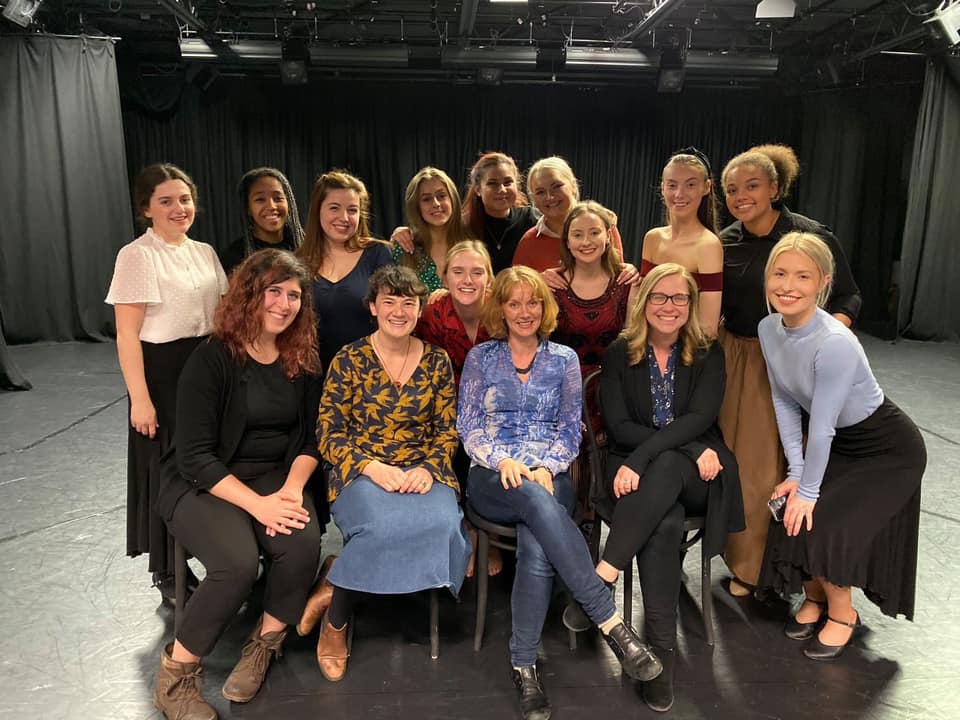
Image: Trinity Laban Musical Theatre Students in rehersal for The Bachelor Girls with Caroline Wigmore and Jen Green
JG: We had a wonderful week with the second-year musical theatre students workshopping The Bachelor Girls at the end of October and the beginning of November. We really appreciated and thought it was wonderful that this was a voluntary project and that we did have male students sign up for it, just to be part of that process.
CW: We always enjoy working with students, these workshops are just invaluable to us, we can try new things, change things on the spot if they’re not working.
JG: I hope that it was really valuable for the students to be part of that workshop process. It’s something that happens a lot in the industry.
CW: We also think there is a shortage of material for that particular age group, where you can actually play your own age and most of the characters in this story are about 18-21 and especially for women you don’t get to actually play your age very often, you are either playing down or you are playing way, way, way up.
WH: Did you enjoy working with Trinity Laban Musical Theatre? how did you find the group?
CW: really, really lovely. We were very pleased with how many changes we were throwing at them through the process and how they took it all on board. Even right up before the public-facing reading that we did on the very last day, I think even an hour beforehand we were still re-writing the dialogue in the closing scene.
JG: Yeah, it was amazing seeing how responsive they were to the changes and the characterisation that they brought, it really felt like they got what we were trying to do and the different areas that we were bringing out. It was wonderful to see and to be able to spend a whole week with the students in that room was invaluable for the development of the show.
WH: It’s great to have such positive feedback, do you think you will be working with Trinity Laban again?
CW: Yeah we certainly hope so. We love working with them, they have a really great programme and the students are really talented so we’d love that.
[Skype end call sound]
—
Music Interlude with Trinity Laban Fulbright Scholar Garrett Snedeker
WH: From 2018 – 2019 Trinity Laban ran it’s Venus Blazing initiative. At least half of all music programmed by the conservatoire was written by female composers. Venus Blazing comprised 60 events and featured 171 works by 120 female composers. This December saw Trinity Laban hosting it’s Venus Blazing Symposium, reflecting on the future.
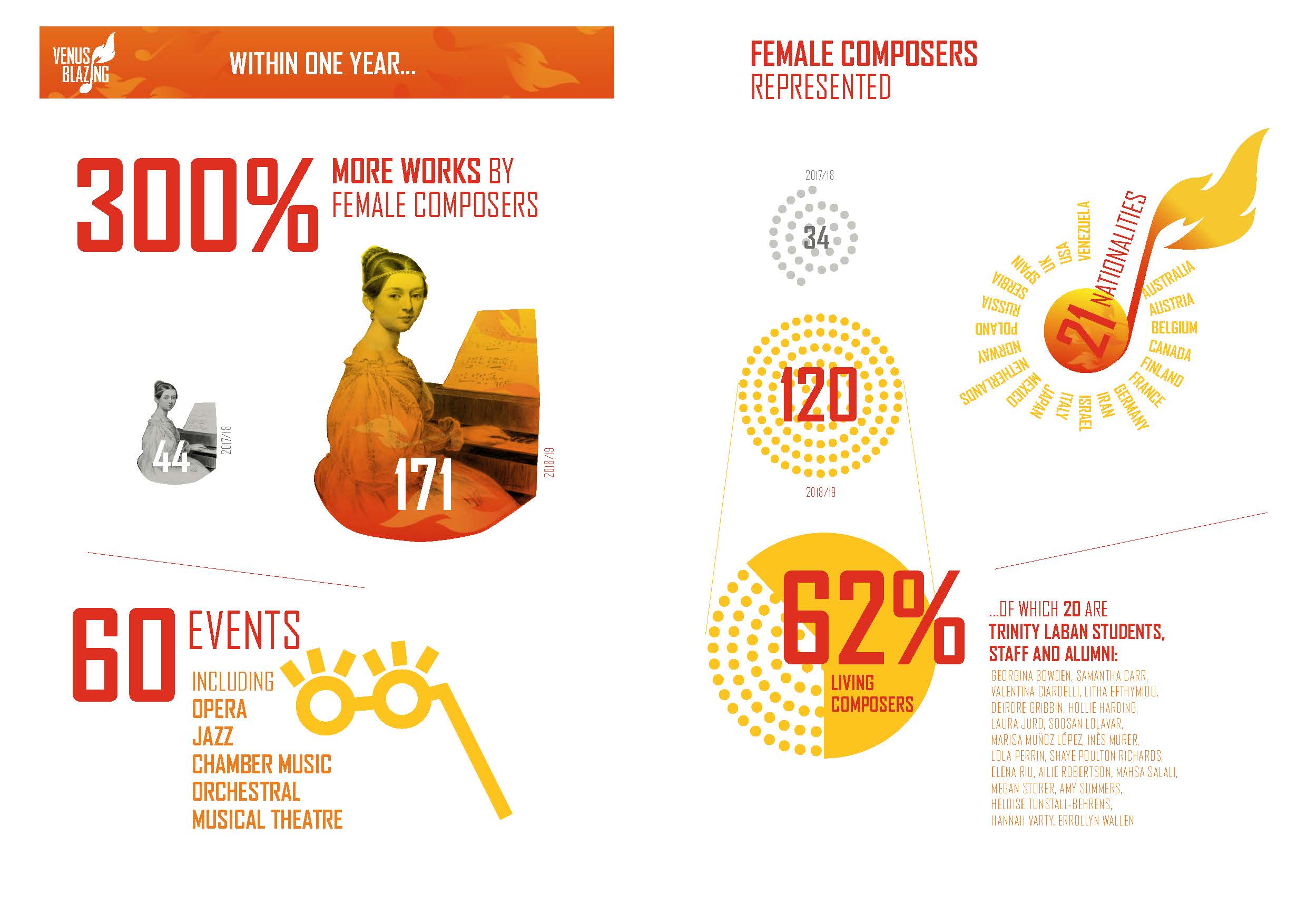
Image: Venus Blazing infographics
WH: One of the speakers was Fulbright Scholar and pianist Garrett Snedeker. Here is he is performing some music featured in the Venus Blazing season.
GS: My name is Garrett Snedeker. This is the first of Clara Schumann’s four Fugitives pieces. [Pièces Fugitives (4), for piano, Op. 15].
[Music Interlude]
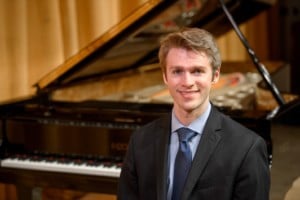
Image: Garrett Snedeker
—
WH: That was Clara Schumann’s first piece Fugitives performed by Garrett Snedeker. Next up Miia Mäkilä and Wilhelmina Ojanen discuss Venus Blazing and their thought on the dance industry.
WH: With last year’s Venus Blazing initiative Trinity Laban was looking for ways to address the imbalance in gender representation in Music. Are there parallel issues of gender imbalance in Dance?
WO: If you look at the number of male choreographers that are in more visible or leadership positions compared to women choreographers there is absolutely an imbalance. We can talk about male and female imbalance in dance but there are also people that identify as non-binary, so how do we address these issues across genders and also support genders that are maybe less visible or less supported at the moment.
MM: I think the patriarchy still exists in the industry hierarchy where we can see more males in power, whereas we see more women as performers, as teachers, as assisting roles. I think it’s a female majority industry but it’s still male dominant.
WO: I would there is still inequality in how women performers are sometimes expected more of. Because there is more competition, there are more women performers actively looking for work than male performers.
MM: The way that we work in Wilhelmina’s company, the size, the shape, the appearance, doesn’t matter. Women can lift men and the roles are not fixed.
WO: I don’t feel like there is any equivalent to Venus Blazing in the dance world in terms of big institutions supporting female artists. There are some smaller dance platforms and initiatives like Woman Srsly by Grace Nichol that aim to support female-identified dance artists.
WH: In what ways would you like to see the dance industry change over the coming years?
WO: I would like to see the dance industry changing in a way that we further more feminine values and qualities. How we speak about our work, how we treat each other, how we push our work forward, doesn’t always have to be seeing everything as a competition. Maybe we could find ways of supporting each other and encouraging each other more.
MM: I would like to see different ways of portraying women on stage to show that we can be funny, we can be bold, we can be in different shapes and sizes.
WO: Supporting all genders and all spectrums of qualities and seeing more difference on stages. Different bodies, different ages portrayed more.
MM: I think there is a lot of unpaid work in this industry.
WO: It almost feels like there is an expectation from choreographers and makers for dancers to work for free as a means of exposure and it’s up to us to say no to those expectations.
MM: Whether it’s about less pay or unfair conditions, I don’t think that can change until we start to say no.
WH: Who are the female dance artists you are most interested in that we should keep our eyes open for?
WO: Another Young Sadlers Wells Associate artist called Ruby Portus. She makes hilarious dance theatre work talking about women’s issues.
MM: I’m a big fan of The Yonis, which is a movement girl band. They are based in London; they tour all around the UK and they really celebrate what it is to be a woman and their bodies. They were performing at Woman Srsly platform recently and also at The Lips Ball, which is organised actually by Trinity Laban graduates, me and my friends.
WH: What advice would you give to aspiring dancers and choreographers especially young women?
WO: I would say hold on to your creative ideas, even if they feel different to what is in the mainstream or what’s seen now on stages. It’s important to really stay true to what you want to make.
MM: I would also say that there is no one way to be a performer or a choreographer, the spectrum is so much bigger than you think and you can definitely find what you are interested in and really go with that and not let anyone push you down.
WO: Stand behind yourself, your worth and your work. But also remember that your worth and your work are two separate things. Make sure you have boundaries, it’s very easy to get consumed by the work and maybe not take care of your body and mind.
MM: I would also like to say that it’s very important to support each other’s work, support each other in general in this industry.
WH: And with that in mind, are there any upcoming performances that either of you are doing that you would like to invite listeners of the podcast too?
WO: We are actually working on a new trio piece called ‘A whisper in the order of things’ Right now, it is in the development phase, hopefully next year it will have a premiere of the longer version of this piece.
WH: Miia and Wil, it’s been an absolute pleasure to talk to you both. Thank you very much.
WO & MM: Thank you.
[musical sound effect]
—
WH: you are about to hear a short excerpt from ‘Looking for a gentleman’, a song from The Bachelor Girls.
[Music Interlude]
WH: The Bachelor Girls is set 100 years ago, in what ways might you say it tells a story that is relevant to the present day?
CW: Well, we were recently in New York with The Bachelor Girls and we took it to She Festival, they accepted applications from female writers, female-driven narratives and a lot of the feedback we got at that point was how amazing it is that it is still relevant and that some of these things that women were railing against in the 1920s are still a problem today. We’ve come a huge distance since that time but we still have quite a long way to go as far as equal rights are concerned.
JG: I think the issues of female friendship are always relevant.
CW: The sense of solidarity between the characters in The Bachelor Girls is something that we are seeing again today in light of the Me Too movement and this realisation that we are stronger together than we are individually, and that’s the theme of the show which is timeless.
WH: Trinity Laban’s Venus Blazing initiative ensured that at least half of all music programmed by the conservatoire was written by female composers, what do you think about our Venus Blazing initiative?
JG: I think it’s a wonderful initiate, I wish that there didn’t have to be initiatives to make that happen. Music, art, everything should reflect the population. If there are approximately 50% female people then it feels strange that we are still in a situation where we need initiatives to raise the profile of female composers and female artists.
CW: Yeah, but it sounds like a great initiative and long overdue. Even in our large scale London venues, if you look at the number of shows being produced that are being written by women it is so so low and it is something that we need to address I believe.
JG: While we were in New York with the She Festival we joined a wonderful picnic for the Maestra organisation, which is set up by Georgia Stitt, doing wonderful things both in the US and the UK to promote female musical theatre writers, MD’s (Music Directors), and creatives in particular.
WH: Would you say there is a balance of gender representation in musical theatre, both on and off the stage?
CW: Occasionally you do get a great show which deals with important topics to women, but they’re not always written by women [laughing]. There’s a question as to who’s being given the big West End composition jobs, and is it just that the same people are being given all the jobs, which happen to be men, and who is holding major players in the West End to accountability for these things.
JG: In musical theatre, all writing jobs and commissions, basically all opportunities, are networking based rather than open calls. Open calls that work are as rare as pixies.
CW: Even with open calls companies will tend to take on the people that they know.
JG: And this isn’t isolated to the musical theatre industry, people will always tend to work with people that they recognise as part of their, for want of a better word – tribe. So, therefore, increased diversity in any way, in any industry requires actual thought and process, because the easiest by default is to fall back to the people that you feel are like you.
WH: In what ways would you like to see your industry change and improve in the coming years?
CW: I would like to see large West End jobs going to new faces and also more creativity among producers about how things are marketed, how audiences are being reached in general. We weren’t in New York very long but we just had this sense while there that they are less risk-averse than the UK. We are very very worried about the budget, which obviously has to be met. But I am just asking the question, are there any ways in which we could be a little more daring with what we’re producing?
JG: I would love to see more mentorship across the industry, across all levels. There are some really good initiatives, for example, The Musicians Union has a music-focused mentorship initiative running at the moment. Something like that across the theatre industry I think could be really valuable in helping encourage development at all levels. It feels like there is a massive dip in the mid-range opportunities at the moment.
WH: What advice would you give to young people who are aspiring to work in musical theatre or aspiring to write for the stage?
CW: It’s interesting when you are talking to young people who are going into theatre because often they all believe that they are actors. They all get into it thinking I want to be on stage, I want to be an actor, and sometimes over time, it becomes clear that they are meant to be in theatre but perhaps not acting. I think that was probably my experience, and so I love to encourage people to explore the different aspects of working in musical theatre. Whether it’s writing or composing, or stage management, or lights or sound, or any of the other wonderful things that you can do within this medium.
JG: I would say if you’re interested, that you want to do it, do as much as you can for as many different varieties as you can. Find what you love doing and just keep doing it. We are artisans and it’s a practice. Things are called practices for a reason, the more you do it, the easier it gets, the smoother it gets. It is a learning process, every time we write we feel like we’ve learned something.
WH: Could I please ask you to give us a hidden gem listening recommendation? This is any piece of music you love that most people will have never come across.
CW: The song that I would like to recommend is called ‘You have to be there’ from the musical Kristina [from Duvemåla]. It’s just a beautifully strong melody which sometimes we’re not getting in musicals these days. I find it really exciting and I would suggest giving it a listen.
JG: I’m going to go with a very left-field one, The Necks, who are an Australian electro-jazz band. Their 2017 album Unfold is theatrical in the sheer epic-ness of the tracks. I would really recommend seeing them live if you can, it’s a really immersive experience without using any words.
WH: Perfect, Caroline Wigmore and Jen Green thank you so much for talking to me today it’s been an absolute pleasure.
CW & JG: Thank you. Thank you Will, always a pleasure to talk about musicals.
[Skype end call sound]
—
WH: So concludes our December edition of Trinity Laban Crosscurrent In conversation with women in the arts. Join us again in 2020 when we will be discussing artistic collaboration.
